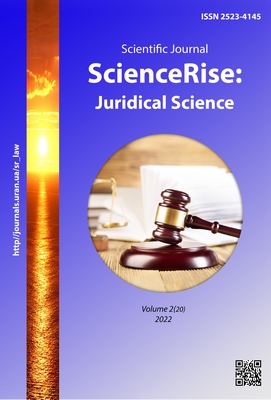Concept of sustainable development in the system of international environmental law
DOI:
https://doi.org/10.15587/2523-4153.2022.259731Keywords:
concept of sustainable development, international order, system of international environmental lawAbstract
The essence of the concept of sustainable development and its significance for environmental protection by means of international law are analyzed. For this purpose, foreign and domestic scientific literature is researched, as well as legal documents, which formulate the goals of sustainable development. It is proved, that the concept of sustainable development should be considered in the system of international law in general, and in International Environmental Law in particular. This approach is due to the consequences of the global economic crisis, COVID-19 and Russia's military aggression against Ukraine. Since the maintenance of international order depends on sustainable development, the main goals of sustainable development are listed, the implementation of which guarantees stability in the world, which should be the basis of international law. Implementing the goals of sustainable development, restoring balance in nature and international relations are expected to be provided by individuals, so understanding the essence of global social processes is extremely important, which indicates the relevance of the study. The development trends of such an international organization as the World Trade Organization, which intensified its activities after the Russian invasion of the sovereign territory of Ukraine on February 24, 2022, are analyzed separately, in particular on issues, such as food security. At the same time, the necessity of using legal, in particular judicial, methods of resolving disputes between WTO members along with diplomatic ones was argued. In general, this work is based on the statement about the importance of implementing the concept of sustainable development to minimize risks, in particular in the field of nuclear safety. It is the priority of stable development of the states that ensure the operation of nuclear power plants that will guarantee global environmental security, which determines the essence of international environmental law, the content and direction of the legal norms that shape it
References
- Tsili staloho rozvytku (2021). Available at: https://business.diia.gov.ua/handbook/sustainable-development-goals/cili-stalogo-rozvitku Last accessed: 16.06.2022
- Zadorozhnii, O. V. (2015). Porushennia ahresyvnoiu viinoiu Rosiiskoi Federatsii proty Ukrainy osnovnykh pryntsypiv mizhnarodnoho prava. Kyiv: K.I.S., 712.
- Dukhnevych, A. V., Karpinska, N. V. (2021). Rol apeliatsiinoho orhanu SOT v suchasnykh realiiakh. Aktualni problemy zemelnoho, ahrarnoho, ekolohichnoho ta pryrodoresursnoho prava, 75–78.
- Stativka, A. M. (2011). Kontseptsiia staloho rozvytku – osnova derzhavnoho rehuliuvannia ekolohichnoi polityky v silskomu hospodarstvi Ukrainy. Problemy rozvytku ahrarnoho ta zemelnoho prava Ukrainy, 20–24.
- Kurman, T. V. (2018). Stalyi rozvytok silskohospodarskoho vyrobnytstva: problemy pravovoho zabezpechennia. Kharkiv: Yurait, 376.
- Rybak, N. O., Tertychna, L. I. (2019). Deiaki aspekty zabezpechennia staloho rozvytku. Stalyi rozvytok silskoho hospodarstva: hlobalni zminy ta natsionalni osoblyvosti dosiahnennia, 34–36.
- Meadows, D. H., Randers, J., Dennis, L. (2004). The Limits to Growth (Updated). The 30-year Updateby. Meadows: Earthscan, 362.
- Kiss, A., Shelton, D. (2021). International Environmental Law. BRILL, 903.
- Novytskyi, V. V. (2014). Kontseptsiia "stalosti" u mizhnarodnomu pravi KhKhI stolitti u konteksti zakhystu prav liudyny. Zakarpatski pravovi chytannia, 173–177.
- Kurman, T. V. (2017). Systema zakhodiv zabezpechennia staloho rozvytku silskohospodarskoho vyrobnytstva: poniattia, oznaky, zmist. Pravo i suspilstvo, 1, 123–128.Available at: http://pravoisuspilstvo.org.ua/archive/2017/1_2017/part_1/24.pdf Last accessed: 16.06.2022
- Nabi, I. M. A. (2014). Osnovni vidminnosti mizh poniattiamy mizhnarodnoho ta svitovoho poriadku v ramkakh teorii mizhnarodnykh vidnosyn. Aktualni problemy mizhnarodnykh vidnosyn, 1 (123), 95–101.
- Goals to Transform Our World. Available at: http://www.un.org/sustainabledevelopment/ Last accessed: 16.06.2022
- Pro Tsili staloho rozvytku Ukrainy na period do 2030 roku (2019). Ukaz Prezydenta Ukrainy No. 722/2019. 30.09.2019. Available at: https://zakon.rada.gov.ua/laws/show/722/2019#Text
- Report of the World Commission on Environment and Development: Our Common Future. Available at: http://www.un-documents.net/our-common-future.pdf Last accessed: 16.06.2022
- Kontseptsiia. Available at: https://esu.com.ua/search_articles.php?id=3256 Last accessed: 16.06.2022
- Malysheva, N. R., Kovtun, O. M. (2021). Pryrodookhoronne pravo Ukrainy u konteksti hlobalizatsiinykh vyklykiv. Chasopys Kyivskoho universytetu prava, 1, 234–239.
- What are the Sustainable Development Goals? Available at: https://www.undp.org/sustainable-development-goals Last accessed: 16.06.2022
- How the UN supports the Sustainable Development Goals in Ukraine? Available at: https://ukraine.un.org/uk/sdgs Last accessed: 16.06.2022
- Twelfth WTO Ministerial Conference. Available at: https://www.wto.org/english/thewto_e/minist_e/mc12_e/mc12_e.htm Last accessed: 16.06.2022
- WTO response to the pandemic, trade and food security take centre stage at MC12. Available at: https://www.wto.org/english/news_e/news22_e/mc12_13jun22_e.htm Last accessed: 16.06.2022
Downloads
Published
How to Cite
Issue
Section
License
Copyright (c) 2022 Lidia Kupchenia

This work is licensed under a Creative Commons Attribution 4.0 International License.
Our journal abides by the Creative Commons CC BY copyright rights and permissions for open access journals.
Authors, who are published in this journal, agree to the following conditions:
1. The authors reserve the right to authorship of the work and pass the first publication right of this work to the journal under the terms of a Creative Commons CC BY, which allows others to freely distribute the published research with the obligatory reference to the authors of the original work and the first publication of the work in this journal.
2. The authors have the right to conclude separate supplement agreements that relate to non-exclusive work distribution in the form in which it has been published by the journal (for example, to upload the work to the online storage of the journal or publish it as part of a monograph), provided that the reference to the first publication of the work in this journal is included.








